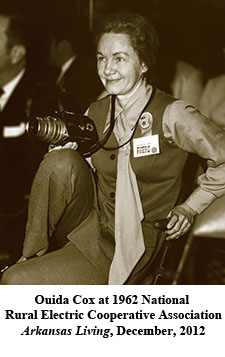Ouida Hutto Cox, long-serving editor of Rural Arkansas (1949-1967) and Arkansas Living (1968-2012), passed away on Oct. 13, 2021, at the age of 98. During her long career, she informed members of the Arkansas Electric Cooperatives, Inc. (AECI) of the interplay of rural life and the extension of electricity to their communities. She and the writers she edited covered topics ranging from recipes and housekeeping to the business and management of AECI, and Cox also participated in AECI’s public workshops and demonstrations.
Cox featured the lives of cooperative members in many of her articles, focusing on their experiences with electric heating, cooking, and washing, providing a unique window on the cultural life of rural America in the second half of the 20th Century. Her journalistic flair and growing use of photos to illustrate the articles eventually expanded the readership of this “trade journal” to include the general public, and the scope to include Arkansas as a whole. By 2012, the year she retired, she had edited 800 issues of Arkansas Living, which was reaching a circulation estimated at 383,000.
Cox joined Arkansas Press Women in 1976, although her greatest impact was felt starting in the 1980s. She placed first in the photography and layout categories in APW’s annual contests in 1984, 1988, and 1991. Twice, in 1989 and 1992, the National Federation of Press Women (NFPW) bestowed second place awards on her winning Arkansas submissions.
In 1989, Cox coordinated transportation for the 1989 NFPW meeting hosted by APW in Little Rock, and also served on the NFPW nominating committee. In 1989, she became APW’s District 5 (Little Rock) director, and in 1992 was selected as a District at Large director.
Her presence in APW was important to many of its younger journalists, such as Helen Plotkin, who joined APW in the 1970s and served as APW President in 1999 and from 2005-2009.
“Ouida was a valued member of Arkansas Press Women for decades, a constant presence at state gatherings, [who] regularly attended the annual conference of the National Federation of Press Women (NFPW). She was an award-winning writer and editor, well known and respected around the state. She brightened up the room with her sparkling eyes, her stylish clothes and her laughter.”
Debbie Miller, APW President in 1994-1996 and 2013-2017, agreed that Cox served as an important model and mentor to rising journalists, noting that “Ouida Cox was an outstanding communicator and a valued member of Arkansas Press Women. She was an icon in journalism circles — the living embodiment of what it was to be a journalist and a professional woman”
Miller reminisced:
“… one morning in the late 1980s or early 1990s, I was on the courthouse lawn in Paragould, Arkansas, and encountered Ouida taking photos of a statue and display outside the historic structure. Here was this immaculately dressed female with long gray hair going about her job of telling stories and taking photos for what my rural, country family had called the REA (Rural Electrification Administration) magazine.
“Later, when I became more involved in Arkansas Press Women, it would be Ouida’s pleasant demeanor and her willingness to be a ‘friendly face’ in the group that so encouraged me as a leader in our affiliate. Ouida also attended NFPW national conferences and used her photography skills to help document events like the annual Communicator of Achievement banquet.”
AECI was established in 1942 to coordinate, inform, and lobby for 18 Arkansas electrical cooperatives. It hired Cox (then 26) in 1949 as an associate editor responsible for the “Women’s Department” of what was then called REA NEWS. Editor Ed Thomas became an important mentor in teaching her the art of news writing, while her growing appreciation for photography meant that photos became integral to the magazine’s image. In 1967, she was promoted to editor of the magazine, then titled Rural Arkansas, but soon to become Arkansas Living. Cox’s extensive travel through Arkansas — on foot, as well as by car — to meet customers of the member cooperatives provided much of the varied content that characterized her stories. Her photographs were featured in other magazines as well, including American Horticulturalist and Arkansas Business and Economic Review.
Born on December 3, 1922, Cox grew up in unincorporated Van Buren County, attending South Side High School. She graduated from Arkansas State Teachers College (now University of Central Arkansas) in Conway after studying home economics and English, and went to work for the Arkansas Farm Bureau, traveling across rural Arkansas to educate families in newer techniques of homemaking. Upon moving to AECI, Cox met her husband, James L. Cox, then working as an agricultural engineer at the Rural Electrification Administration. (In 1952, he, too, moved to AECI.) The couple had two sons, James L., Jr. (who remained in Little Rock) and Thomas Earl (who moved to Colorado), and Cox later described the challenges of combining a seven day a week job with child rearing. Her husband left AECI in 1961 to work with the Jacksonville Electrical Cooperative, where in 1983 became general manager. In 1986, he passed away
APW invites members to share their memories of Ouida.

